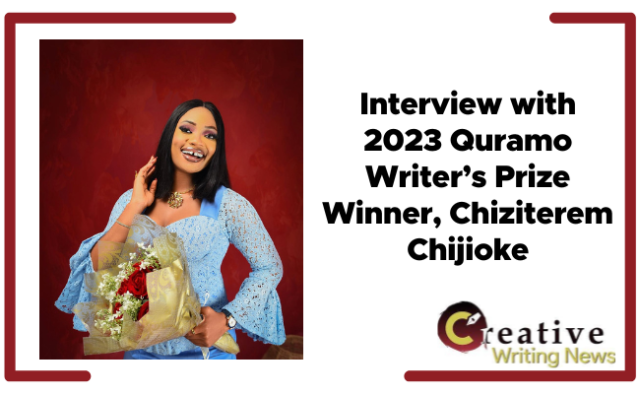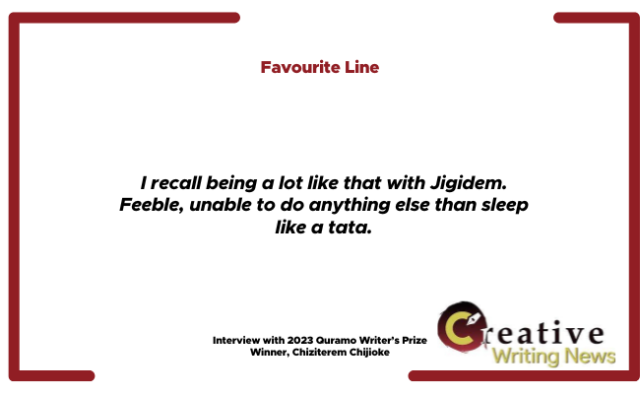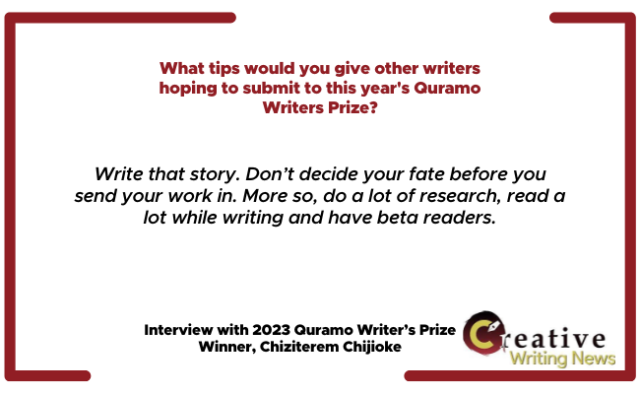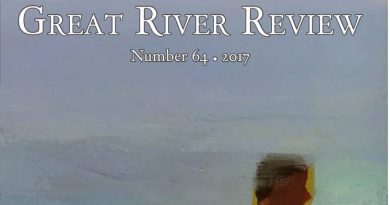❝I Had Applied For It Twice Before The 2023 Edition❞— An Interview with Quramo Writer’s Prize Winner, Chiziterem Chijioke
Chiziterem Chijioke is the 2023 winner of the Quramo Writer’s Prize and the second female awarded since its inception in 2017. She is a Creative Director, Digital Marketer and Storyteller with a B.Sc in Mass Communication from Ajayi Crowther University. She is an experienced writer with a history of working in the writing and editing industry. Chiziterem currently serves as an Editorial member of the Creative Writing News team, as well as a Junior Creative Director at That Good Media. Additionally, she is a writing coach with immense interest in the bloom of writers in Nigeria.
Chiziterem’s Quramo Writer’s Prize story, Dear Zimi, is about a pregnant undergraduate and how she navigates the changes in her life following her circumstances.
We sat down for an interview with Chiziterem Chijioke to learn about her preparation for the last Quramo submission and the moments leading up to the announcement of the winner.

How did you find out about the Quramo Writer’s Prize?
Hi, thank you for having me. I found out about the Quramo Writers’ Prize through a writing community I am part of. I have been aware of the prize since 2019. More so, working as an editorial member for a creative writing news blog, kept me updated with writing awards and that included Quramo. As a matter of fact, I had applied for it twice before the 2023 edition.
When you submitted to Quramo, was your draft complete already, or did you have just the expected 30,000 words indicated in the submission guidelines?
When I made the submission to Quramo, my draft was complete. It was about 54,000 words. Also, it was the third draft. The initial plan I had for the manuscript was to submit it for Quramo in 2022, but as at then, it was nowhere near complete. So I decided to calmly finish the story and submit for its next opening, which was 2023.
What led you to submit for the prize, and how did you feel when you hit send?
When I decided to write the manuscript, Dear Zimi, I had not written for a long time. I had been so swamped with school and life generally. For a while I stopped feeling like a writer. So, towards the end of 2021, I made a list of goals for 2022. One of them was to write a story and make a submission to Quramo and various other writing awards. So I was already determined to get it done. Prior to this, I had made writing submissions for manuscripts, but I was rejected in all. I told myself that I didn’t want rejection to make me deter. I even comforted myself with the story of J.K Rowling.
When I hit send, my fingers were crossed. I honestly didn’t feel like the story was enough, but I told myself that I had nothing to lose and something to gain.
How was it like writing your winning story?
For me, the preparation to write the story was more interesting. I spent a year preparing to write. I did a lot of research, asked people a bunch of weird questions, consulted professionals, created a plot outline, talked to my characters like a crazy person, this helped me get in the mood to write. It was why I spent a shorter time writing the story. Because I was immersed in the idea of bringing all of it to life. Having spent half of 2021 preparing to write, I wrote the story in 4 months in mid-2022. Then — as I said earlier, I missed the Quramo deadline and didn’t think the story was fit then. So I began sending to beta readers who helped me shape the second and third draft of the story.
How long have you been writing?
I have been writing since I was thirteen. My earliest memory of writing was reading a book and wanting to know how the author did that. How could someone think up such a beautiful story and put it in words?
What is your writing process/routine?
My writing process is in stages. Here it goes— Have an idea, create a plot outline, start making research, talk to my characters, imagine them, be them if need be. And finally, write.
What is your winning story about and Why did you want to write it?
My winning story is about a girl, Zimife, who gets pregnant while on strike from the university. The story takes us through her life as she navigates the pregnancy, tries to make decisions and handles the relationships in her life. The idea of the story was quite random. Firstly, I knew I wanted to write, I was hungry to write. So all I needed was an idea. So the idea for the story came to me when my friends in federal universities complained about the strike. Then there were jokes on the internet about getting married or giving birth by the time the strike is called off. So that gave me an idea.
How was it shuffling between other activities and writing this story?
It wasn’t easy. I was in school when I began. But I knew that if I didn’t make time for it, then I may never write. So I squeezed in whatever time I had to spare and forfeited some things just so I could write.
What did it feel like being announced the winner? Can you put it into words?
Even as a writer, I can be short of words, too, you know. But I’d try. I think the right words are astounded and ecstatic. These were how I felt. Before the winner was announced, as I stood on that stage, I felt fear, then anxiety and then acceptance. Acceptance that it was enough to be on the stage anyway, even if I didn’t win. It was alright. So when they announced me as the winner, I was in disbelief. So much so that I shed tears of joy. My dream came true.
What do you think the judges admired about your story? How does it connect with readers?
From the announcement by the judges at the festival, it was expressed that the story “offers a compelling narrative that explores themes of love, friendship, and self-discovery against the backdrop of contemporary Nigerian society. The manuscript’s originality, coherence, narrative strength, language, and dramatic intensity make it a deserving contender for the Quramo Writers’ Prize.”
I think the story will connect with readers because Zimife could be any girl, any young woman. The story is relatable, and as the judges said — the protagonist is multi-dimensional. The addition of all the characters that make up the story and how the protagonist navigates her relationship with all of them make it a more enjoyable journey.

Can you share a favourite line from your story?
I have so many favourite lines, to be honest, but here are two.
“I recall being a lot like that with Jigidem. Feeble, unable to do anything else than sleep like a tata.”
“She would look like you, petite. I don Dey see her nose.”
Quramo has announced the publication of your story. Is there a timeline for readers to expect it to hit shelves? And how is the editing process going?
I can’t give readers any timeline for now, but I’ll surely give the update across social media platforms when the time is close. The editing process has been interesting on my end. My editor has been really good, and the process has been fun. I’ve had to reread my book, see things I didn’t see before, smile at things I’d written, and just feel the story in a deeper sense. I think I like this phase.
How does it feel to be the first female winner in the history of the competition being published?
It feels really great. It is an incredible honor to have my work recognized and to be part of such a prestigious competition. I’m just thrilled at the opportunity to share my story with readers.
 What tips would you give other writers hoping to submit to this year’s Quramo Writers Prize?
What tips would you give other writers hoping to submit to this year’s Quramo Writers Prize?
Write that story. Don’t decide your fate before you send your work in. More so, do a lot of research, read a lot while writing and have beta readers.
What will be your next step after winning the Quramo Writers Prize?
I’d aim higher. I hope to get more writing recognition. I also hope to write more amazing stories that the world can read.
What is your unpopular opinion about writing?
Grammar rules can be flexible. Just identify what works for you.
Thank you very much for taking the time to answer our questions, especially as the Quramo Writer’s Prize is already open. We hope that this is enough incentive to convince others to dare and hit the submit button like you did.





